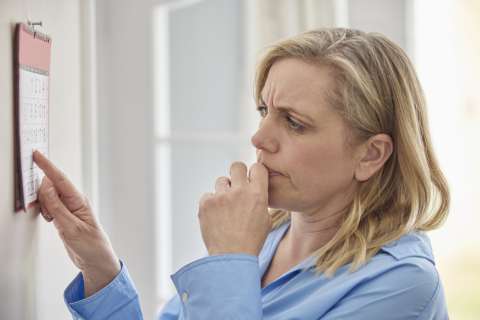Key takeaways
- It's estimated that nearly 160,000 people will be diagnosed with colorectal cancer in the U.S. in 2026.
- Since the 1990s, there has been a 1% to 2% annual increase in colorectal cancer diagnoses in people younger than 50.
Cure rate for people with stage one colorectal cancer is more than 90%; that drops to less than 15% for late-stage cancer.
Colorectal cancer starts as a polyp, a growth, on the inner lining of the colon or rectum. Polyps are common, especially as we age, and most are noncancerous. Some polyps, however, can turn into cancer over time, forming cancer cells in the wall of the colon or rectum, where they can grow into blood vessels that can spread to other parts of the body.
The American Cancer Society estimates 158,850 people will be diagnosed with colorectal cancer in 2026 in the U.S., with 55,230 deaths.
Here, UCLA Health expert Folasade May, MD, PhD, addresses frequently asked questions about the disease. Dr. May is an associate professor of medicine at the David Geffen School of Medicine at UCLA and associate director of the UCLA Kaiser Permanente Center for Health Equity. She is also a member of the UCLA Health Jonsson Comprehensive Cancer Center.
Q: How common is colorectal cancer?
Dr. May: Most people are pretty surprised to learn that It's the third most common cancer in men, and it's the third most common cancer in women. And when you look at deaths from cancer, it is the number two cause of cancer deaths when numbers for men and women are combined.
Also concerning are rising rates in people under the age of 50. The American Cancer Society recently published that colorectal cancer is now the most common cancer in men and women under age 50, which is new and concerning.
Q: Why is colorectal cancer on the rise?
Dr. May: Overall, when we consider people of all ages, it's actually on a decline. And that's because since the late 1990s, we've had colonoscopy and other screening modalities. But since the 1990s, we've seen a 1% to 2% increase per year in cases in people under the age of 50. The reason it's on the rise among that subgroup is still unknown. It is certainly something environmental over genetic, meaning that the human genome has not changed or does not change that rapidly. And we think that it probably has to do with diet, it probably has to do with environmental toxins and exposures that have yet to have been discovered. But those are all actively being pursued in scientific research now.
Q: What causes colorectal cancer?
Dr. May: Colorectal cancer always originates in colorectal polyps. Polyps are like bumps or little pimples that grow along the lining of the colon and rectum. More than 50% of people will develop polyps in their colon or rectum in a lifetime. But only a small percentage of these polyps have the chance of progressing into a cancer. And what we've noticed is that as we get older, the number of polyps goes up. We've also noticed that polyps are more common in men than they are in women.
So those two groups are definite risk factors: age and male gender. But it obviously happens in women, too. So we have to be very careful when we say that, because a lot of people read that polyps are more common in men, and then they think, oh, I'm a woman, I'm not at risk. And we work really hard to make sure that women also know that they are just as at risk for colorectal cancer.
Q: Is colorectal cancer hereditary?
Dr. May: It can be hereditary, and some genetic syndromes are linked to colorectal cancer. One common one is called Lynch syndrome. That's just one of several that travel in families and increase your chances of getting colon or rectal cancer. So that's why I always remind people that beyond age, beyond sex, I also want to know your family history. If you have a first-degree family member, meaning a mother, a father, a brother, or a sister, who’s had colon or rectal cancer, then you also have a higher risk of getting colon or rectal cancer and need to start screening at an early age
Q: What are the symptoms of colorectal cancer?
Dr. May: Unfortunately, most colorectal cancer is asymptomatic, meaning that it doesn't cause symptoms. And that's why screening is so important. A large majority of people will walk around with this cancer, sometimes for years, and not know that they have it.
But if they do develop symptoms, the most common is blood in the stool. People can also have a change in their stool pattern, meaning that they can move toward being constipated all the time or having diarrhea all the time, for months on end. And then we also think about the change in the shape of your stool: people who had normal caliber stools and then, all of a sudden, have thin, ribbon-like or pencil-shaped stools. And when colorectal cancer becomes very advanced, we also can see weight loss and abdominal pain as well.
Q: How is colorectal cancer diagnosed?
Dr. May: Colorectal cancer is diagnosed primarily in two ways. One, someone is getting screened. So again, usually, it's going to be someone who's asymptomatic, thought they were completely healthy, went in for that routine colonoscopy at age 45, and we find colorectal cancer in that setting. The other way it is diagnosed is when someone develops symptoms like blood in their stool, change in the stool, the way the stool looks or abdominal pain, and a gastroenterologist does the colonoscopy, and we find it that way.
Q: Is colorectal cancer treatable?
Dr. May: Absolutely. But it’s important to understand that the cure rate depends on the stage when you are diagnosed. For people who have stage one disease, so early cancer, the cure rate is over 90%. Unfortunately, if the cancer has progressed to stage four, which is late-stage cancer, the cure rate drops to less than 15%. So, this really emphasizes the importance of early diagnosis.
Q: How can I prevent colorectal cancer or lower my risks?
Dr. May: The number one way to prevent it or to lower your risk is to get screened as recommended by our national guidelines. And that guidance is that unless you have a family history, you should start screening at age 45. And if you do have a family history, you start screening at age 40. So that's our number one tool for prevention and early detection.
The second tool is lifestyle modification. We know that if we increase our fiber, we lower our risk. We know that if we reduce the amount of red meat and processed red meat, we reduce our risk. Other things that can be very helpful are to avoid tobacco and minimize alcohol, increase your exercise or physical activity and make sure that you're getting plenty of vitamin D and calcium.
Q: What is a colorectal screening?
Dr. May: There's a big misconception that colonoscopy is the only screening test. You can screen with a colonoscopy, which is a procedure that is performed by a gastroenterologist. It's usually done in a hospital or in a medical procedure unit, and it requires the individual to take a colon prep to clear out the colon the night before the procedure. It also requires the individual to be put asleep for the procedure and have someone drive them home after the procedure.
About 70% of screening in the United States is done by colonoscopy. But it's important to know that there are many barriers to colonoscopy. Some people have a hard time finding a gastroenterologist. Some people are terrified of medical procedures and needles. Others can’t get a day off of work to have the procedure. So, luckily, we have other methods to screen for colorectal cancer.
The second most common are stool-based screening tests that you can do in the comfort of your own home. You are sent a kit, and the kit instructions walk you through how to safely and cleanly collect a sample of your stool. Once you collect the sample, you send that into a lab where they test the stool for blood. And some of the tests also test the stool for DNA of cancer. So, if that test comes back abnormal, then you have to have a colonoscopy to see if there is a polyp or a cancer that's causing that test to be abnormal. So, these are two-step tests. The first step is the stool-test and for the 9% or so who have an abnormal result, the second step of colonoscopy is required.
Beyond the stool-based test, there's also a CT colonography. And then, most recently, we are starting to see some blood tests that will start doing some screening as well. These blood tests are still new so we are still trying to learn how to incorporate them into practice.
Q: Who should be screened and how often?
Dr. May: Everyone who is at average risk and has no family history should start screening at age 45. How often you are screened is going to depend on the test you're using and the results of that test. For colonoscopy, if a colonoscopy is completely normal, then you don't need to have another colonoscopy for 10 years. But if the colonoscopy detects high-risk polyps or pre-cancerous polyps, then you'll need to have a colonoscopy sooner than that — maybe again in three or five years.
The stool-based tests are usually performed every three years or every year, depending on the type of test.
Q: Do these guidelines apply if you have a family history of colorectal cancer?
Dr. May: No. If you do have a first-degree family history, meaning mother, father, brother or sister, you should only be screened with a colonoscopy, and you shouldn't use any of those other tests I mentioned. In addition, people with a family history in a first-degree relative should have a first colonoscopy at age 40 or 10 years earlier than the age of the family member who was diagnosed with colorectal cancer (whichever is earlier) and repeat colonoscopy every five years. Those are the three main differences.
Q: What advice would you give to people regarding colorectal cancer?
Dr. May: My biggest advice is to get screened when you’re indicated for screening. So, if you have a family history, that's age 40 or earlier with a colonoscopy. If you don't have a family history, it's age 45, and you have many screening test options. Ask your primary care physician to order the screening test that’s appropriate for you.
My other piece of advice is to try to live a healthy lifestyle that includes exercise, eating foods high in fiber and whole grains, and minimizing the amount of tobacco, alcohol and processed foods that you consume.
Finally, but also extremely important, is that if you have symptoms of blood in the stool, rectal pain, new and persistent diarrhea or constipation, see a doctor about getting a colonoscopy regardless of your age. We don’t want these symptoms to go ignored.




